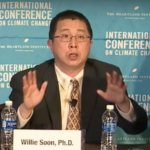
Benny Peiser is een sociaal antropoloog die sinds jaar en dag het klimaatdebat op de voet volgt. Lange tijd was hij vrij neutraal, hoewel hij wel langer ageert tegen het gebruik van doemscenario’s. Hij verstuurt dagelijks CC-net rond, een elektronische nieuwsbrief, met klimaatnieuws uit kranten en (wetenschappelijke) bladen aangevuld met e-mails van zijn groeiende groep lezers.
Ik sprak Peiser op 18 november nog in Brussel tijdens het door Roger Helmer georganiseerde eendaagse seminar. Peiser blijft ervan overtuigd dat niemand de toekomst kan voorspellen, ook de sceptici niet en dat we dus niet weten of we opwarming dan wel afkoeling gaan krijgen.
Er waren voornamelijk ‘sceptici’ aanwezig tijdens het seminar en er heerste een stemming van ‘het debat begint te kantelen’. Maar niemand kon bevroeden dat een dag later climategate zou uitbarsten. Sindsdien proef ik een verandering in toon en aanpak bij Peiser. Hij is minder productief in het verzamelen en rondsturen van CC-net. Ondertussen is hij samen met Lord Lawson The Global Warming Policy Foundation gestart. Ik heb hem sinds 18 november niet meer gesproken maar het lijkt erop dat climategate voor hem de druppel was en dat hij nu sterker dan voorheen een positie in neemt in het debat. Dat blijkt ook uit onderstaand opiniestuk dat hij dit weekend publiceerde in de Indiase Business Standard.
For the last 20 years, one IPCC report after another has been responsible for a relentless outpouring of doomsday predictions. The IPCC process, however, by which it arrived at its alarmist conclusions, has been shown on numerous occasions to lack balance, transparency and due diligence.
The IPCC’s work is controlled by a tightly-knit group of individuals who are totally convinced that they are right. As a result, conflicting data and evidence, even if published in peer-reviewed journals, are regularly ignored, while exaggerated claims, even if contentious or not peer-reviewed, are often highlighted in IPCC reports.
Not surprisingly, the IPCC has lost a lot of credibility in recent years. It is also losing the trust of more and more governments who are no longer following its advice — as the Copenhagen summit showed.
Claims by RK Pachauri, chair of the IPCC, that IPCC’s erroneous doomsday prediction about the fate of Himalayan glaciers was an isolated, and wholly uncharacteristic mistake, are completely baseless.
There is ample evidence to show that the IPCC review process is neither robust nor transparent. In 2007, when the IPCC published its latest report, the Panel claimed that global warming was to blame for an increase in the number and severity of natural disasters such as hurricanes and floods. Yet the paper on which the IPCC based its assertion had not been published at the time.
When it was finally published in 2008, its conclusion contradicted the IPCC’s false alarm, stating: “We find insufficient evidence to claim a statistical relationship between global temperature increase and catastrophe losses.”
Not just in this case, but on other contentious issues, the IPCC has consistently promoted alarmist predictions. On issues such as the possible affect of global warming on malaria, human health or national economies, IPCC authors habitually prefer to cite alarmist papers while research findings that come to less gloomy conclusions are often disregarded.
In the latest instance, the GWPF has just released details of the defective process by which the 2035 Himalayas date got into an IPCC report. As a result of a Freedom of Information request, David Holland, a GWPF researcher, gained access to the responses by IPCC’s lead authors. The documents show that most doubts and questions that were raised about the 2035 date were ignored and that the review editors failed to take any note of it.
But even where the IPCC relies on peer-reviewed papers, it does not guarantee that its claims and conclusions are reliable or trustworthy. As the notorious “hockey stick” controversy about temperature reconstructions has shown, IPCC contributors have consistently failed to disclose their data and methods while the IPCC has consented to such misconduct.
The Panel’s inner circle has been characterised for many years by an endemic bias towards alarmist assessments and calls for radical action. There are growing concerns among many governments about the way the IPCC works and how it produces its conclusions. Its demand for drastic economic changes is posing a serious political predicament for many governments, not least in India. After all, most countries find themselves unable to control, let alone reduce, CO2 emissions, as realistic alternatives to cheap fossil fuels are non-existent. It is this concern about the potentially-destabilising consequences of the IPCC’s radicalism based on unbalanced and unreliable professional advise that has led to calls for a reform of the IPCC.
The IPCC’s agenda and its catastrophic framing of climate change is mainly driven by western government departments staffed by green ministers, civil servants and researchers, many of whom have strong personal backgrounds in environmental campaigning and ecological ideologies.
Any significant IPCC reforms will ultimately depend on the economic and political cost of its workings and how it threatens the stability of national economies. The Indian government has more or less conceded that the radical actions promoted by Pachauri and the IPCC are threatening to undermine realistic government policies.
The price of climate hysteria has eclipsed the value of political and economic stability. The time has come to completely overhaul the structure and workings of the IPCC. Unless it accepts to undergo a root and branch reform, it will continue to haemorrhage credibility.
Business Standard 28 January 2010






Beetje Off-Topic, maar wel interessant om te zien dat niet alleen bij CRU met de getallen geknoeid wordt:
http://briefingroom.typepad.com/the_briefing_room…
gebeurt ook nog te weinig mee, met dat geknoei met temps in nw zeeland, australie, rusland, fimland, w-antartica.
Jammer
Dit schijnt overigens binnen de wetenschap wel vaker gebruik te zijn. Wie niet schrijft wat zij willen, die willen zij niet dat die schrijft.
Global Warming makes the case against Global Government!
http://factsnotfantasy.blogspot.com/2010/02/globa…
Zie Peiser live: http://www.wacholland.org/nl/nieuws/benny-peiser-…